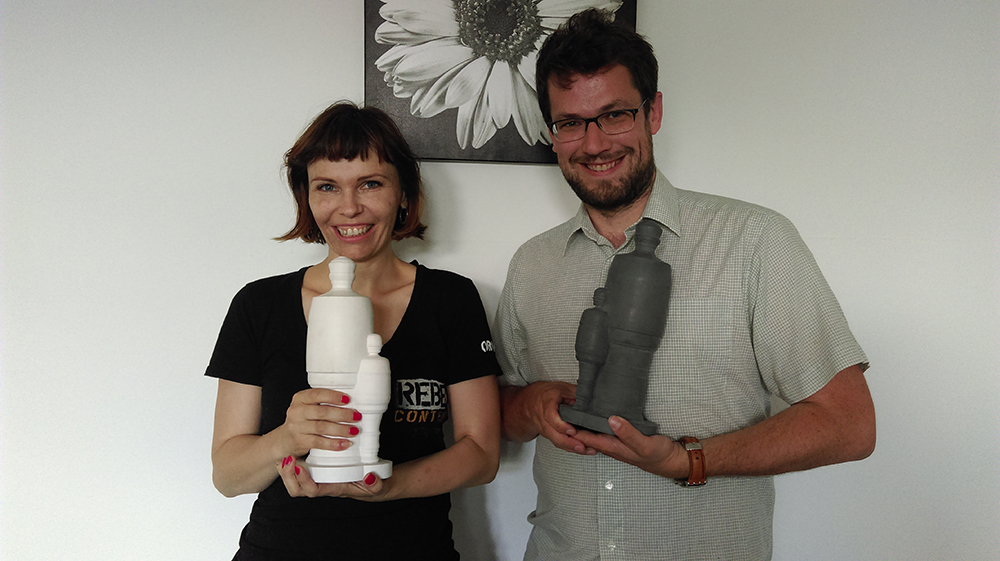Member in the Spotlight: Iuridicum Remedium
Iuridicum Remedium (IuRe) is a non-governmental, non-profit organisation promoting human rights. It addresses issues of infringements of individual rights resulting from legislative actions and also deal with specific cases of human rights violations.
This is the third article of the series “EDRi member in the Spotlight” in which our members have the opportunity to introduce themselves and their work in depth.
Today we introduce our Czech member Iuridicum Remedium (IuRe).


Helena Svatosova and Jan Vobořil, IuRe, with Big Brother Awards trophies
1. Who are you and what is your organisation’s goal and mission?
Iuridicum Remedium (IuRe) is a non-governmental, non-profit organisation promoting human rights. We address issues of infringements of individual rights resulting from legislative actions and also deal with specific cases of human rights violations. IuRe’s activities include current threats to human rights in the fields of Human Rights and Technology, but also Social Exclusion and Public Administration. IuRe is active in issues related to legislation and legal assistance. It disseminates information to both the professional community as well as general public.
Our programme Human Rights and Technology aims to create a barrier against the misuse of digital technologies in cases of unjustifiable breaches of individual privacy. Among other activities, IuRe organises the Big Brother Awards Czech Republic annually. Our regular public debates raise awareness about both actual and potential suppression of the right to be left alone. IuRe monitors and prepares comments on new legislation and also provides legal consultancy for individual cases. Within the scope of this programme, we also work on localising and promoting Creative Commons Licensing as an alternative to the traditional intellectual property schemes.
2. How did it all begin, and how did your organisation develop its work?
IuRe was founded in 2001 as a volunteer initiative of the students of the Faculty of Law, Charles University Prague. Our professionalisation started in 2003. In 2005, we organised Big Brother Awards evening for the first time.
3. The biggest opportunity created by advancements in information and communication technology is…
…simplification of communication between people, the possibility of free sharing of information, opinions and views on the world, regardless of distance or political regimes.
4. The biggest threat created by advancements in information and communication technology is…
…transfer of our private life to computers or mobile phones and monitoring of these devices by businesses or governments. Another threat is also life in filter bubbles, which prevents access to information that contradict our opinions. This is a paradox, in a way, considering the answer to the previous question…
5. Which are the biggest victories/successes/achievements of your organisation?
We appreciate the victory of 2011, when the Czech Constitutional court accepted our constitutional complaint supported by 53 Members of the Parliament and annulled national data retention regulation. Although we have data retention back in our Communication Act without governmental reaction on Data Retention Directive repeal, this ruling of the Constitutional Court is one of the key ones for the interpretation of the text when searching for the limits of right to privacy in the Czech Republic.
Our last victory was the decision of the Czech Data Protection Authority (DPA) in April 2016 based on our complaint, which ordered the destruction of about three million cards with the blood samples (meaning also DNA) of all newborns. These samples were collected and then unreasonably kept indefinitely in connection with the implementation of a predisposition test for some severe diseases since the 1980s.
6. If your organisation could now change one thing in your country, what would that be?
The Czech government has introduced a series of measures designed to monitor and control citizens over the past few years. They declare that it is not only justified by greater safety, but also by interests of transparency, the fight against corruption, and the need to control tax collection and public expenditures. The trust the state has to its own citizens is thus increasingly being replaced by control. We would be delighted if people had put more pressure on politicians and made them emphasise privacy.
7. What is the biggest challenge your organisation is currently facing in your country?
Generally, it’s often populist proposals that threaten privacy with particular reference to increasing safety in connection with terrorism or the refugee crisis. We think that in this area the number of challenges will increase in proportion to the growing fear in society. We also monitor with concern the continuous extension of the databases related to the health of citizens.
Specifically we now have now a lot of work with our campaign on DNA legislation. In 2015 we prepared new DNA act, which was supported by more than 25 percent of the members of the Czech parliament across almost all political parties. The government had unfavorable opinion, but the positive effect was, that they have started with own amendment of the Police Act, which regulates the use of DNA by the police and the existence of the forensic DNA database. We have prepared comments on the draft and enforce some of the changes that are necessary in our opinion.
8. How can one get in touch with you if they want to help as a volunteer, or donate to support your work?
We are very grateful for the work of all our volunteers and for donations that support our campaigns, because it is difficult to raise money for our issues in the Czech Republic. Information on how to support us is available here: http://www.iure.org/podporte-nas
Iuridicum Remedium (IuRe)
http://www.iure.org/EN
Member in the spotlight series
https://edri.org/our-work/member-in-the-spotlight-series/
(Contribution by Jan Vobořil, EDRi member Iuridicum Remedium, Czech Republic)

